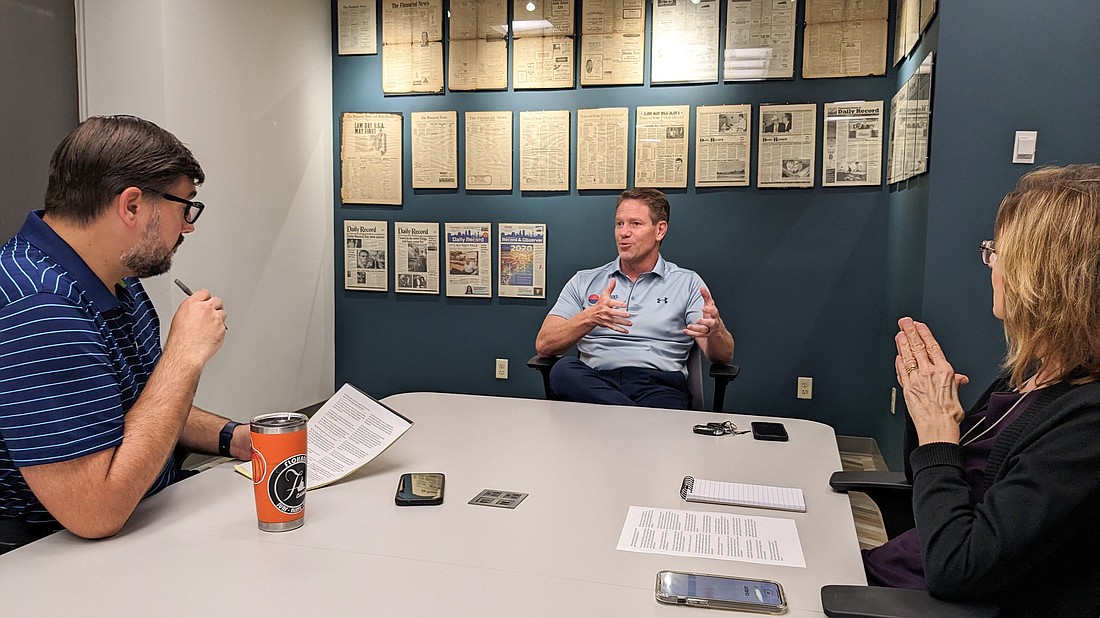
In the final two weeks before the city’s May 16 runoff election, the Jacksonville Daily Record invited mayoral candidates Daniel Davis and Donna Deegan to participate in a policy conversation with the newspaper’s editorial team.
The following is a 30-minute interview May 3 with Davis at the Daily Record office in Downtown Jacksonville.
The JAX Chamber CEO and Republican discussed his priorities including looking to the private sector to reduce the size of City Hall; his intent to relocate the Duval County Jail out of Downtown; giving the Downtown Investment Authority more autonomy; affordable housing; and his philosophy on the city giving incentives to private companies.
Update: Read the May 11 Daily Record Q&A with Democratic mayoral candidate Donna Deegan here.
Q: What are the policy priorities that would define the first year of a Daniel Davis administration?
A: I have thought about this and I really feel like there is an opportunity to emulate a little bit of what I did when I came into the JAX Chamber. I stayed focused for about a year on just making sure the organization ran the most efficiently, and I listened to our members and what they wanted to see in value for their membership.
It’s the same type of thought process of getting the nuts and bolts right of running city government is important to me. Obviously, we’ve stated what our vision is for the campaign and that is, you know, a smaller city hall where you get more police officers on the street, more infrastructure funding, and get the smaller things right, the purpose of government right, and then move on. If you do that correctly, the big things come along. I really want to keep my head down the first year and just get government on track and running the right way.
Q: You were just talking about it, and you mentioned it in the Action News Jax mayoral debate, you want to make City Hall smaller. What kind of cuts would you make to prioritize infrastructure, to put 200 police officers on the streets? Where would you cut and would you be able to save enough money there to pay for those initiatives without raising taxes?
A: I truly believe priorities on how you spend are the way that you get to the 50 new officers per year. And as a former finance (committee) chair and president of the City Council, I understand the budgetary process. The money is there if you prioritize correctly. And so that’s something that I feel confident about.
I do feel confident that we don’t need to add new employees to City Hall either. So that’s going to be something that we’re going to be very focused on, making sure that we run efficiently and that we keep government smaller and get more of the taxpayer dollars on the street.
Q: If you’re replacing another Republican mayor, are you going to make wholesale changes in the top positions and leadership spots at City Hall and also on the boards and commissions?
A: What I’m focused on right now is winning May 16. And I promised no one a job, from top to bottom. I’ve been pretty proud of the fact that we have not talked to anybody about where they possibly could end up. I think that helps us stay focused on what the goal is at hand. We’ve seen before where folks start figuring out who’s going to be in what office, and you don’t ever get past the finish line. So, that’s not something that we’re going to get started on because I believe it’s a mistake.
Q: You mentioned not hiring new employees to keep growth at City Hall at a minimum. What areas would you make cuts (in) to save additional money? Are there areas that you see that you think are too big right now that you think need to be reduced?
A: We’ll get into that after the election. I do think that there are ways to use technology more appropriately. I think that there are private-sector solutions to some of the issues. We do have shortfalls and making sure the right people are in the right seats is critical and that’s an expertise that I have as a CEO and the experience I had at the (Northeast Florida) Builders Association at the chamber. Understanding the right people in the right places is critical and that’s something that we will take a deep dive on.
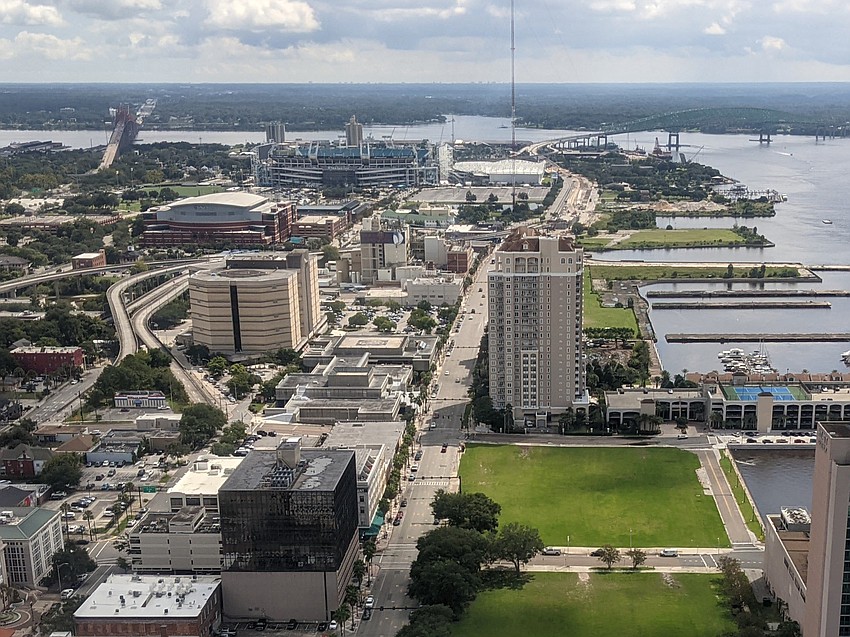
Q: Moving on to the stadium renovation, which is on top of pretty much every taxpayer’s mind in the city. You said during one of the televised debates that you would lead the city’s negotiations on the Jaguars stadium. You’re not going to bring in outside folks to do that. How would you finance the city’s portion of that investment?
A: That’s to be determined, and it’s how many projects are we going to going to focus on in Downtown? I think that there are ways that you can do that. I’ve talked to several institutions that would be a part of that.
So it would be similar to the discussion on how do you finance the move of the jail, and I’m going to move the jail out of Downtown Jacksonville. And there are ways that you can do that partnering with private and public entities to where the finance stack works, and it’s not as big a hit on the capital program upfront.
That doesn’t mean you privatize the corrections operations, because I think that’s a huge mistake. But in construction there are companies all over the globe that work with municipalities on making sure that can happen.
Q: We’ll get back to the jail in a minute, but will the stadium remain city-owned in your plan?
A: We’ll see. I mean, if you go into negotiations, what you don’t do is play your hand before you go sit at the table. So we’re not going to discuss how in the amount and what we believe is fair. What we will say is, I believe I’m the right person to sit at the negotiation table. I have the experience and the public should feel comfortable that it’s going to be a transparent process and they will be brought along with it with us.
Q: You mentioned moving the jail. Where to?
A: I believe, probably the P-Farm (Montgomery Correctional Center) on the Northside where we have facilities already and space available. It would probably be the best option, but I’m not the expert. And I’m going to listen to the sheriff and, obviously, his team and in what they would see as the most appropriate place.
Q: Historically, the jail likes to be close enough to the courthouse because you have to transport (inmates). Does that play into it because that’s a long way from the courthouse?
A: Listen, I used to work in the courthouse when the jail was right next door. And I believe times have changed and it’s not necessary anymore. You use technology. You could use technology for J-1 (first appearance hearings at the jail courtroom). And I think that that’s something that we have to start moving and looking in that direction.
I think it’s very important. If we’re serious about the development and what we think Downtown should be, we have to have a serious conversation about the Police Memorial Building and the jail and what the future is. It’s tired. The building is in desperate need of repair. The corrections officers are working in deplorable conditions. (Duval County Sheriff) T.K. (Waters) is doing a great job recruiting, now we’re starting to see good classes of corrections (officers) coming in. But you see it and you can understand why somebody wouldn’t want to work in that environment. And so, we have to make sure that the corrections officers are in a safe place, that they’re being paid appropriately and that they’re not required or have to do as much overtime. Because right now we have so many vacancies they have (to fill).
Q: What would you say about Maxwell House (coffee plant) because that’s right next door?
A: That’s a private sector company, and I’m less inclined to get into private sector businesses than I am about why do we have government buildings on the river and why don’t we move them off and have those placed back on the taxpayer rolls? I understand why they historically are on the river. But it’s time for us to move those buildings.
Q: Would you move those buildings in your first term? And if so, what are the logistics of doing that in four years?
A: The jail will be a first-term initiative.
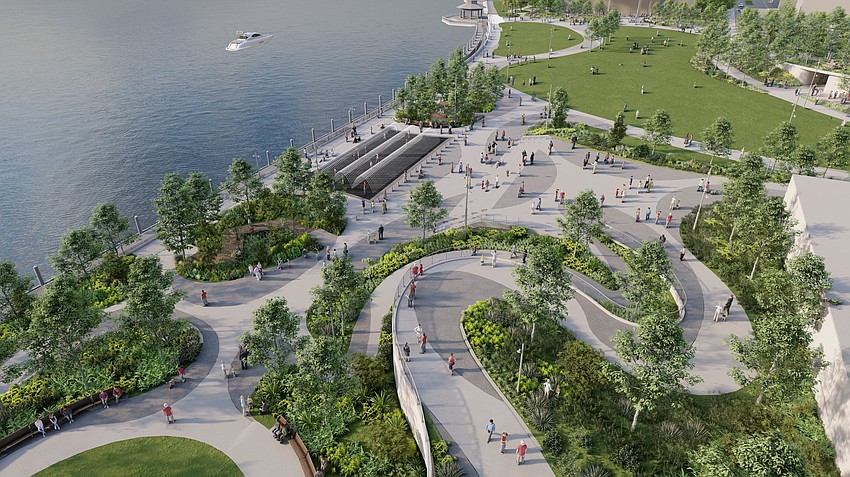
Q: What’s your opinion on the DIA’s (Downtown Investment Authority) current riverfront development strategy, including the public park space?
A: I’m all in favor of the public park space. I do believe that we need to maintain that public park space in an appropriate fashion. And I don’t think the city is capable of maintaining the parks at that level.
It’s much like you have an agreement with an association to run your ball fields. The dads and the moms are out there working the concession stand and mowing the grass and they keep the field at a level that’s suitable. I think that we’ve seen that successful across the city of Jacksonville. An example of it is the Four Seasons maintaining Metro Park. That’s it. That’s a good example of how a private entity, it could be for-profit or nonprofit, can maintain for the city.
I would like to put together a Friends of the Parks group that could help raise private dollars (and) partnership with the city publicly to maintain what the city builds. The city should build world-class parks, and they should be maintained that way. And I think that there is a solution for a public-private partnership.
Q: There’s been a lot of pockets of real growth Downtown. You look at the North Core and all those buildings being renovated. But then you have all these big projects along the river that come in fits and starts. What would be your role and bringing those up or getting those determined?
We have a lot of office towers Downtown that remain fairly vacant. What would be your role in trying to fill those up? Is housing an option or do you have companies coming in or anybody on the hook you’re bringing in for Downtown?
A: You know, I’ve never told you about who I’m bringing in. Somehow you still find out. But I would tell you everything you just said is very, very important, unique ways to look at this. We have facilities and we know that residential is in high demand in Downtown. And we should be very, very creative in how we build workforce housing and utilize what we have in place.
I do believe we need to take a serious look at DIA and give DIA more autonomy with oversight from City Council and City Hall. But we cannot make it harder to develop in Downtown than it is out in the suburbs. We already have infrastructure in place here and in many ways we create a harder process for a developer to get an answer or to get to yes.
Not only our permitting department, but I believe we should make this process of a yes or no quicker. That doesn’t mean you skip steps. Time and certainty are what make developments work. Uncertainty and not knowing what time causes people to just say I’ll go somewhere else. I’m going to make sure that we have a streamlined process and we will explain all that to the community. We will explain it. Obviously, you have to get approval from City Hall (City Council) to be able to do that. And that’s a vision of mine is to make sure that we make the process easier.
Q: You talked about making it as efficient as it is to do a project in the suburbs. What is not efficient about how Downtown development is handled today?
A: The process. You can’t drag a developer along and expect them to stay with you and not go somewhere else. Because their time is money and they’re going to try to get their project done as quickly as possible. We’ve got to streamline the process. I think once you get the final approval, then you go back to City Hall and you could have 19 amendments on the approval that you just had. Which, if I’m the developer, I think I am not going through two or three approvals. And then you have to go through the permitting department, which oftentimes takes over a year to get permits and get your project out of the ground. That’s not acceptable.
If we want to see the community grow, that’s not acceptable. And if we want to see Downtown for what it should be, we’ve got to take a serious look at ourselves and how we how we handle that process.
Q: You mentioned giving DIA more autonomy. Would part of streamlining that process be DIA having the final say on a lot of these incentives?
A: On some projects, yeah.
Q: And how big would that incentive threshold be? Because right now there are certain numbers that you know they can’t go above.
A: We’ll get to that. I think that’ll be a serious conversation with the members of the City Council and me on what they feel comfortable with. That doesn’t mean you don’t have an annual approval just like the City Council approves the budget. You still have oversight. I believe it can be streamlined.
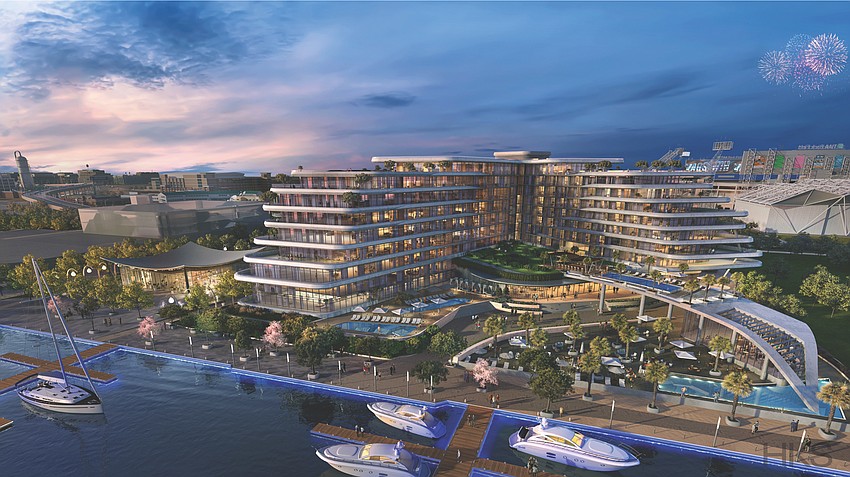
Q: Did you think the city deal with the (Jacksonville Jaguars owner Shad Khan) Four Seasons (hotel), the incentives package to build that, do you think that was a good deal for the city?
A: I think that the process was much better. I believe there were really good parts about that deal. For instance, in taking the maintenance of the marina, building a new marina, taking the maintenance of Metro Park, handing the covered field back over to the city for youth football, or whatever the city sees fit, are all really good parts of that deal — doing a performance-based incentive to where we’re not giving you money upfront, but you complete this and you’re going to there’s going to be an opportunity there.
Fifty-fifty deals are what we’ve seen in the last couple of years and that’s something that I think the citizens start to start going ‘OK, everybody’s got skin in the game.’
Q: I get all your campaign fliers you send. Early on, I was kind of surprised that one of them called the hotel deal wasteful spending.
A: No, that was, one of my opponents was setting himself up to look like he wasn’t participating in that and we just made it clear that he was participating in it. That was the intent of the mail(er).
Q: You mentioned recruiting with the police. I saw some reports about potentially bringing back the pension to the police department. Is that something that you’d be in favor of?
A: I’m hearing around Jacksonville that there’s a situation where we are training police and fire (personnel) in Jacksonville. They are staying about three years, and then they’re moving to a surrounding county or back home and going into FRS (the Florida Retirement System). That’s an anecdotal conversation that I’m having with folks that are involved. And I don’t have data that proves that is happening. How many people we’re training and they’re leaving. And I think that once we do have that, we all gotta get around the table and decide what the options are and how you retain the recruits that we bring in.
What I would tell you is that a city pension is off the table for me. I don’t believe we’re going to go down that road. I believe that if there’s a conversation of a Florida retirement pension program, plus, people could have an option of the 401(k) if they like that, all that conversation, to me, is on the table. It would have to be revenue neutral. But I think that’s something that we should look at.
Listen, when as CEO of the chamber, it’s more important for me to keep my employees and I have to adjust. We had to adjust all salaries at the chamber because it’s way less expensive to keep them than it is to go find new ones then plug them in and train them. So, it’ll be the same discussion when you’re at City Hall.
Q: You said to reinstate a pension for those employees it would have to be revenue neutral. So if there was a pitch to do it but would impact capital fund spending ability and increase the city’s obligations, would that be off the table for you?
A: Yeah, I mean, I said I believe there are options that would be revenue neutral, and honestly, I’m the type of person that I’ve looked at a 401(k) and how rich this 401(k) is, and, man, that’s something I would be … if I were an employee, that’s something I would be after. Because I’ve seen how much it can grow. But I do understand that a lot of firefighters and police officers, if they’re serving and putting their lives on the line, they want to have security in their future. And I understand how that can be attractive. So we just need to understand it and make wise business decisions.
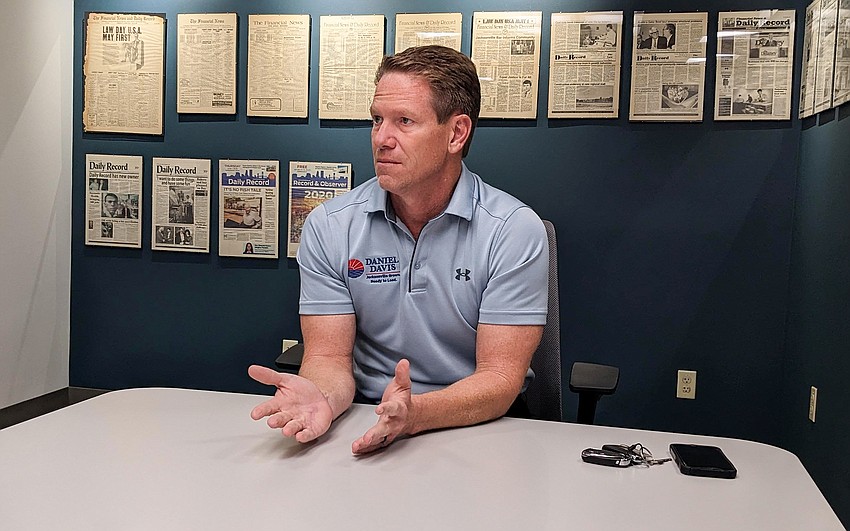
Q: What do you support about the city’s current economic incentive policies to attract private businesses? In what ways would you change how City Hall incentivizes private companies and developers?
A: This is something I’ve been involved with for a long time. I believe in it. I believe we have a great story to tell. And we’ve been very successful. And so one thing that you will not see is checks written to companies upfront without performing.
We’ve seen that happen in Jacksonville’s history and around the state, and Jacksonville and the state of Florida have been burned on that. That will not happen in Jacksonville. Now I do like infrastructure incentives. I do like it when JEA can partner with us and make sure that if the company needs more security or more loops on their electric grid that we can do that — road or infrastructure.
Because if you have infrastructure incentives, if that company doesn’t make it, then you still have the infrastructure in place so another company can plug in and the citizens have been made whole. I have no issue with REV grants (property tax refunds). I believe that those are highly useful, and they’re attractive to companies.
I mean, you think about FIS (Fidelity National Information Services) and how we were able to utilize a surface parking lot. The tax revenue on a surface parking lot versus a $150 million building are two dramatically different things for the city of Jacksonville, plus the jobs and everything that comes with it — that type of performance-based incentives. Because, obviously, you have to build the building to be able to enjoy the REV grant. So those are things that I would be in favor of and we’ll work very hard.
Q: You said no money upfront but cash completion grants have become a thing for some of these bigger projects. Is that something that you still support?
A: I’ll look at training opportunities. I think that you can train and I think that what happens there when you train employees or give opportunities to train employees, you still are creating this workforce that’s trained. If they have to move folks to Jacksonville, that could be an option out there. But what my focus is going to be on is performance-based incentives.
Q: So the cash completion grant, is that something you’d still support?
A: We’ll look at that.
Q: What about affordable housing? That is a huge issue in Jacksonville and all around the country now. What would be the mayor’s role in creating more affordable housing?
A: I call it workforce housing. Because I think that’s what we’re really talking about. When a teacher or firefighter can’t afford to live where they work, we’ve got a problem. And I think that we have to create more opportunities there. And what the city’s role can be is I’m going to survey city-owned property and I’m going to make a portion of that available for workforce housing.
That’s going to make the finance stack work for these developers that build workforce housing. But the only way that would happen is if you maintained that housing in perpetuity. So, it’s not like it could be flipped at some point. And the developer or the owner can make a lot of money based on a piece of property that the city would partner with a developer on.
Q: What about those folks in Jacksonville who don’t qualify for the workforce housing and would be more along the lines of an area median income that’s considered eligible for affordable housing? What’s the mayor’s role in trying to help find housing for that lower-tier income bracket in Jacksonville?
A: Yeah, I think that can be a part of this process, too. But my focus is going to be on the workforce housing and to make sure that those hardworking folks that don’t quite make it. And, honestly, I have talked to thousands of them during this campaign. And it’s becoming a reality that your utility bill and your rent are something you’re choosing between. It’s real.
Now, that’s something we have to take a really hard look at, and make sure that we understand that people are struggling to make ends meet on a regular basis. I was just talking to folks yesterday, we finished the day knocking around seven o’clock. And this struggle in our community is real. And I think that we cannot lose sight of these hardworking folks that are just trying to put food on the table and make their rent and their utility payment.
Q: The city has awarded a lot of incentives over the last eight years. Bond debt is at a reasonable level but cash incentives that were previously awarded to developers and companies, such as Paysafe or the Four Seasons project, they’re going to start coming due in the next 10 years, and they’re going to put more strain on the general fund revenue. How do you ensure that the city has the money to pay its bills while keeping the CIP (Capital Improvement Plan) spending at the levels that it has been the last few years?
A: I think that the Jobs For Jax program (gasoline tax increase and extension) is going to be a great step forward to make sure that we are funding infrastructure. And not just roadways, but the Emerald Trail and things that are very important to quality of life. But removing wasteful spending and continuing to grow our community.
If you think we did well when I was working at the chamber, bringing high-paying jobs here and corporate headquarters, wait until I’m on the fourth floor of City Hall.
I’m going to work every day to attract more companies here to continue to fuel the economic engine in Jacksonville. That broadens our tax base and helps us be able to fund the things that we need to fund. Like I said, if we focus on getting the small things right, and being excellent in the nuts and bolts of government, all of the big things are going to come.
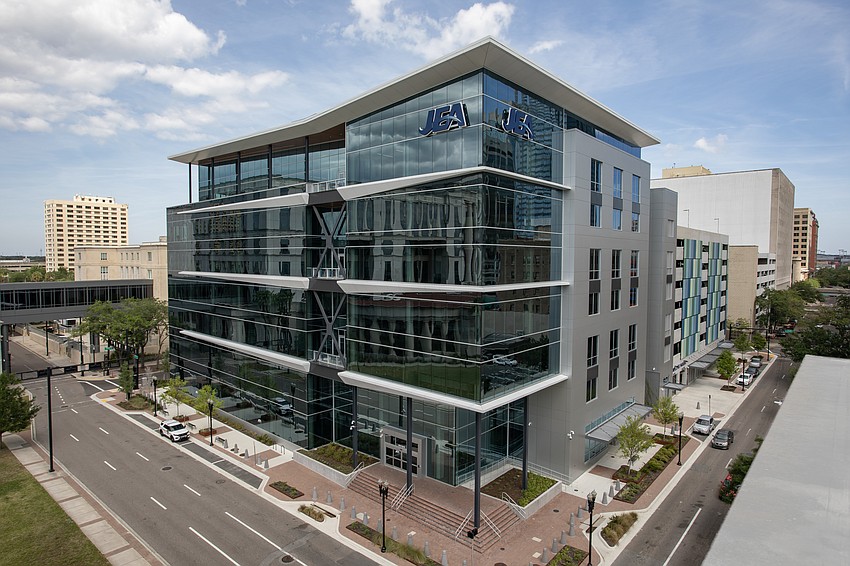
Q: How do you feel the openness of our government is right now? Do you feel like it can be better? Is that something that you think would be a priority to make government more open so people can find out more about their community and what’s going on in the city?
A: That’s absolutely my goal. I think that you can see where in the past have not been as open during a process. And then you can see how you can be when you bring the community along with you. It’s always a much better process and a better result at the end of the day.
I have great ideas. But when I share them with people, and they give me their feedback, those ideas get better. So why wouldn’t you go out there and get more ‘Hey, I think you’re heading down this road the right way. But if you do these three things it’s going to be way better.’ So, you assimilate that into your vision and now you’ve got all the people that have helped you helping get across the goal line. And it’s just a way that I’ve seen success in my career and that’s what I’m going to do at City Hall.
Q: So fewer secret projects is what you’re saying?
A: There are certain things that you have to protect, right? Companies that are moving here and they don’t want their employees to read into Jacksonville newspaper that they’re moving, you know? They want to handle it the right way in New Jersey or wherever they are. And yeah, I think that’s something that we’ll continue to respect.
Q: You made it pretty clear in a few debates that you will not sell JEA. What do you think about JEA’s current structure? Is there anything you would change? Its leadership, the directions it’s going with its energy assets, what changes do you think need to happen at JEA?
A: We’ll get into that in the next couple of weeks. I will tell you (JEA CEO) Jay Stowe has been very impressive to me. He’s been a great partner at the chamber. And I think he’ll be a great partner moving forward. I do think there’s always an opportunity to become more efficient. There’s always opportunity, and whether it’s City Hall or JEA or the chamber of commerce, there’s always an opportunity to become more efficient. The citizens own JEA and we need to just have serious conversations about how we can become a better asset for the citizens.
Q: What about privatizing the management and operation of JEA while keeping it city-owned? That was a consideration at one point and is that attractive to you?
A: We’re not going anywhere near that. I think that JEA is going to be citizen owned while I’m mayor. I do think we need to get back to building community and really being the best asset for the citizens that it can be.
Q: The mayor is only as effective as their team. How are you going to go about filling those key positions at City Hall, whether it be chief administrative officer, chief of staff or your CFO? What are you looking for in those positions and how would you expect them to interact with the City Council and the public?
A: Look at my leadership team at the chamber of commerce and it reflects what the community looks like. And it is the most talented people I could possibly find. And I have been successful by surrounding myself with folks that are way more talented than I am. And they always thrive. I give autonomy. I let them have much opportunity to show success, bring great ideas and execute great ideas. And that’s the same attitude I’m going to bring to City Hall.
I believe we have plenty of talent in Jacksonville, Florida. We don’t need to go out and look somewhere else to bring folks in. Like I mentioned earlier, I have not made a promise to anybody about working in my administration. But, obviously, I have a vision and I’ve been working here for 26 years. So I have a lot of folks that are very talented that I think would do well at City Hall.
Q: Do you have any influence on who would replace you at the chamber?
A: Well, I mean, that’s to be determined. There’s definitely a search committee that would be in place to hire. Whether they chose to ask me what my opinion was, I’d be honored to be a part of that process, but it’s ultimately the leaders of the chamber that would be the ones that would go search.
Q: Would you see taking some of your talented folks at the chamber with you to City Hall, considering a new chamber CEO might want to bring in his or her new leadership team?
A: We’ll cross those bridges when we get to it, but there are incredibly talented folks at the chamber.
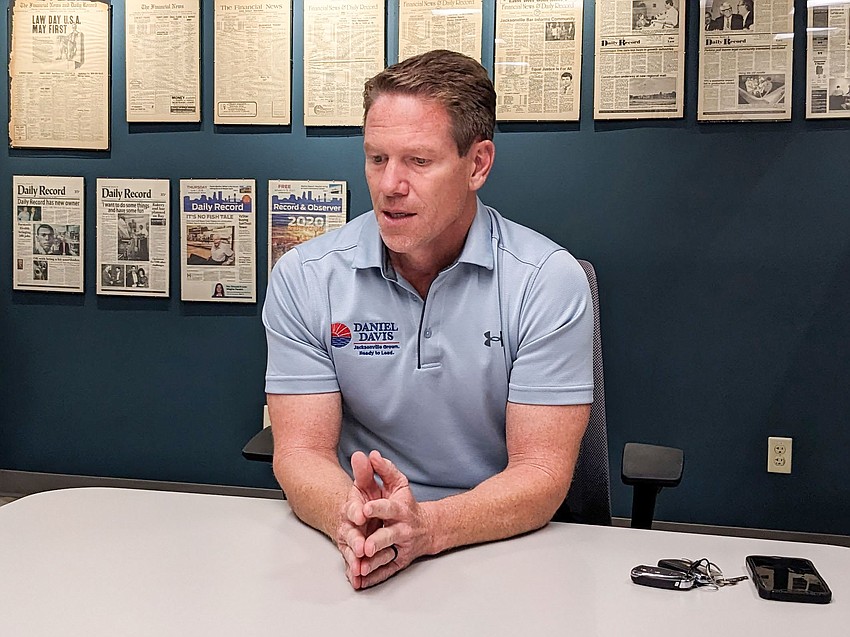
Q: Your campaign has been interesting. You’ve really pounded away at your foes, more so than I can recall. It’s politics, but once you get to the mayor’s office, you turn over a new page. Is your campaign going to reflect how you’re going to run the city?
A: I think that we all understand the nature of politics. And campaigns are rough. It’s not for the faint of heart. And you should have seen some of the things that were said about me in the campaign. What I have to do is just be resolute and determined to move forward for the city of Jacksonville. And if you can’t handle a campaign, you definitely aren’t going to be able to handle being the mayor of Jacksonville. It’s not easy. It’s tough.
There are tough decisions that have to be made. But my style is not a scorched earth, burn all the bridges style. I fully suspect and expect May 17 that everybody comes together and we move our city forward. But I mean, to walk into a campaign thinking anything is not going to be rough going is, I think, foolhardy. We all know what we’re getting into when you put your name on the dotted line.